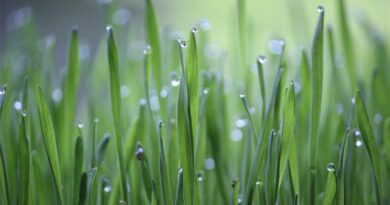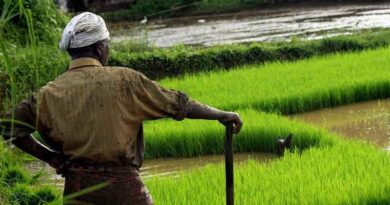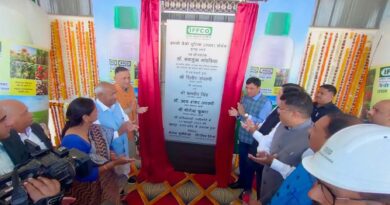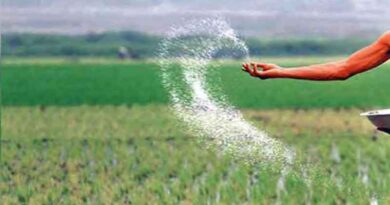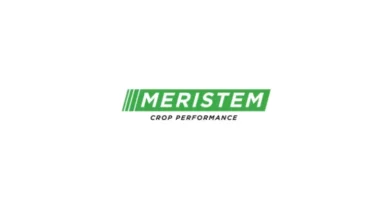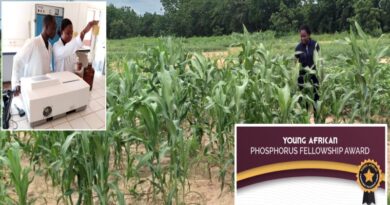News report on fast tracking approvals for Nano Urea with incomplete trials is misleading: Govt
05 September 2022, New Delhi: A leading national daily has carried a misleading news report today alleging that “Nano Urea has been fast tracked for approval despite incomplete trials”. The news report is erroneous, mis-informed and presents partial view of the existing facts and data available on the subject.
It has been wrongly quoted in the news report that the process has been “fast tracked”. It is clarified that the established and existing procedure for registration of any fertilizer for notification as per Fertiliser Control Order (FCO), 1985 has been fully accounted for.
Nano Urea has been notified provisionally under FCO based on existing procedure for introduction of fertilizers under FCO, 1985 which requires data from only two seasons. Nano Urea has been provisionally notified under FCO based on encouraging results and feedback received from scientists of ICAR and State Agricultural Universities. Central Fertilizer Committee (CFC), Ministry of Agriculture & Farmers Welfare (MoA & FW) has also recommended it based on data and due deliberations in this regard.
In addition, Department of Biotechnology (DBT) has also been referred to for safety & biosafety issues. It is only after satisfaction with regard to efficacy, biosafety and biotoxicity that Nano Urea has been brought under FCO as a separate category of nano fertilizer.
Furthermore, the data is not limited to two seasons as have wrongly been communicated through the news report, as research and farmer field trials have been continued for last more than four seasons.
Table 1. Nano Urea Trial, Season wise / Crop wise – Experimental trials undertaken
| Experiments | Season | Crops & Trials (Nos.) |
| “On Station” Trials | Rabi 2019-20(24 Nos.) | Cereals: Wheat (11);Oilseeds: Mustard (1);Vegetables: Onion (2); Capsicum (1), Cabbage (1), Tomato (3); Parthenocarpic Cucumber under polyhouse (1)Sugar Crops: Suru Sugarcane (1) |
| “On Station” Trials | Summer 2019-20(3 Nos.) | Cereals: Paddy (1); Maize (2) |
| “On Station” Trials | Kharif 2020(16 Nos.) | Cereals: Paddy (6); Maize (5); Pear millet (3)Fibres: Cotton (1)Vegetables: Okra (1) |
| “On Station” Trials | Rabi 2020-21(8 Nos.) | Cereals: Wheat (6);Oilseeds: Mustard (1);Vegetables: Onion (1) |
| “On Station” Trials | Summer 2020-21(2 Nos.) | Cereals: Paddy (1); Maize (1) |
| “On Station” Trials | Kharif 2021(21 Nos.) | See Table 2. |
| “On Station” Trials | Rabi 2021-22(19 Nos.) | Wheat (8); Rapeseed/ Mustard (3); Onion (1); Groundnut (1); Sunflower (1); Ginger (1), Turmeric (1), Sugarcane (1), Paddy(1), Maize (1) |
| “On Station” Trials | Kharif- 2022(7 Nos.) | Paddy (3); Apple (1), Bajra (1); Fingermillet (2) |
| “On Station” Trials | Rabi -2022-23(6 Nos.) | Continued |
| “On Farm” Trials | Rabi 2019-20 | 93 crops; 11224 trials (9037 recorded) |
| “On Farm” Trials | Kharif 2020 | 44 crops; 1511trials (1435 recorded) |
| “On Farm” Trials | Rabi 2020-21 | 34 crops; 1126 trials |
For evaluation of Nano Urea, premium ICAR research institutes and state agricultural universities have been at the vanguard of nano urea trials. Different aspects associated with crop productivity; reduction in fertilisers dosage, farmers profitability have been addressed through these trials. A list of some key research institutes / SAUs engaged in nano urea trials are as under (Table 2).
Research institutes / SAUs engaged in nano urea trials are as under (Table 2)
| S. No. | Crops | Location | Season/ Year Onwards |
| 1 | Maize | ICAR- CRIDA, Hyderabad, Telengana | Kharif 2021 |
| 2 | Fingermillet | AICRPDA Centre, Bengaluru | Kharif 2021 |
| 3 | Upland Rice | AICRPDA Centre, Jagdalpura, Chattisgarh | Rabi 2021-22 |
| 4 | Irrigated Rice | IRRI-ISARC,Varanasi | Kharif 2021 |
| 5 | Rainfed Rice | IRRI-ISARC,Varanasi | Kharif 2021 |
| 6 | Rainfed Rice | IRRI-ISARC, Assam | Kharif 2021 |
| 7 | Wheat | CSSRI Karnal, Haryana | Rabi 2020-21 |
| 8 | Paddy | CSSRI Karnal, Haryana | Kharif 2021 |
| 9 | Wheat | AAU, Anand, Gujarat | Rabi 2019-20 |
| 10 | Maize | AAU, Anand, Gujarat | Kharif 2021 |
| 11 | Wheat | ANDUAT, Ayodhya, UP | Rabi 2019-20 |
| 12 | Wheat | MPUAT, Udaipur, Rajasthan | Rabi 2019-20 |
| 13 | Wheat | SKNAU, Jobner, Rajasthan | Rabi 2019-20 |
| 14 | Wheat | IARI, New Delhi | Rabi 2019-20 |
| 15 | Mustard | IARI, New Delhi | Rabi 2019-20 |
| 16 | Pearlmillet | IARI, New Delhi | Kharif 2019-20 |
| 17 | Wheat | BAU, Ranchi | Rabi 2019-20 |
| 18 | Paddy | UAHS, Shivamoga, Karnataka | Rabi 2019-20 |
| 19 | Paddy | TNAU ( Bhavanisagar Stn.) Drone Expt | Kharif 2021 |
| 20 | Maize | UAS GKVK, Karnataka | Summer 2019-20 |
| 21 | Maize | PJTSAU, Telengana | Summer 2019-20 |
| 22 | Onion | MPKVV, Rahuri, Maharashtra | Rabi 2019-20 |
| 23 | Cabbage | IIHR, Bengaluru, Karnataka | Rabi 2019-20 |
| 24 | Cucumber | IIHR, Bengaluru, Karnataka | Rabi 2019-20 |
Summary of results of application of nano urea – liquid (Nano N) across different locations and agro-climatic regions has revealed that foliar application of nano urea at critical growth stages of crops like Rice, Wheat, Maize, tomato, cucumber and capsicum etc., lead to reduction in application of nitrogenous fertilisers and also increase yield in range of 3-23 % in wheat; 5- 11 % in tomato; 3-24 % in paddy / rice; 2-15 % in maize, 5 % in cucumber and 18 % in capsicum.
Science and scientific endeavours are a continuous process and significant efforts go in the process from concept to translation stage. Nano fertilizers are novel in the way that they provide immense opportunity in terms of addressing the challenges being faced by intensive agriculture practices currently underway which are ultimately harming the soil, air and water in the long run. It is therefore prudent that nano fertilizers like nano urea are holistically viewed in perspective of declining nutrient use efficiency (NUE) of chemical fertilizers and alternative solutions that need to be made available to farmers.
Also Read: 2022 Norman Borlaug Award to Indian Scientist Dr. Mahalingam
(For Latest Agriculture News & Updates, follow Krishak Jagat on Google News)


